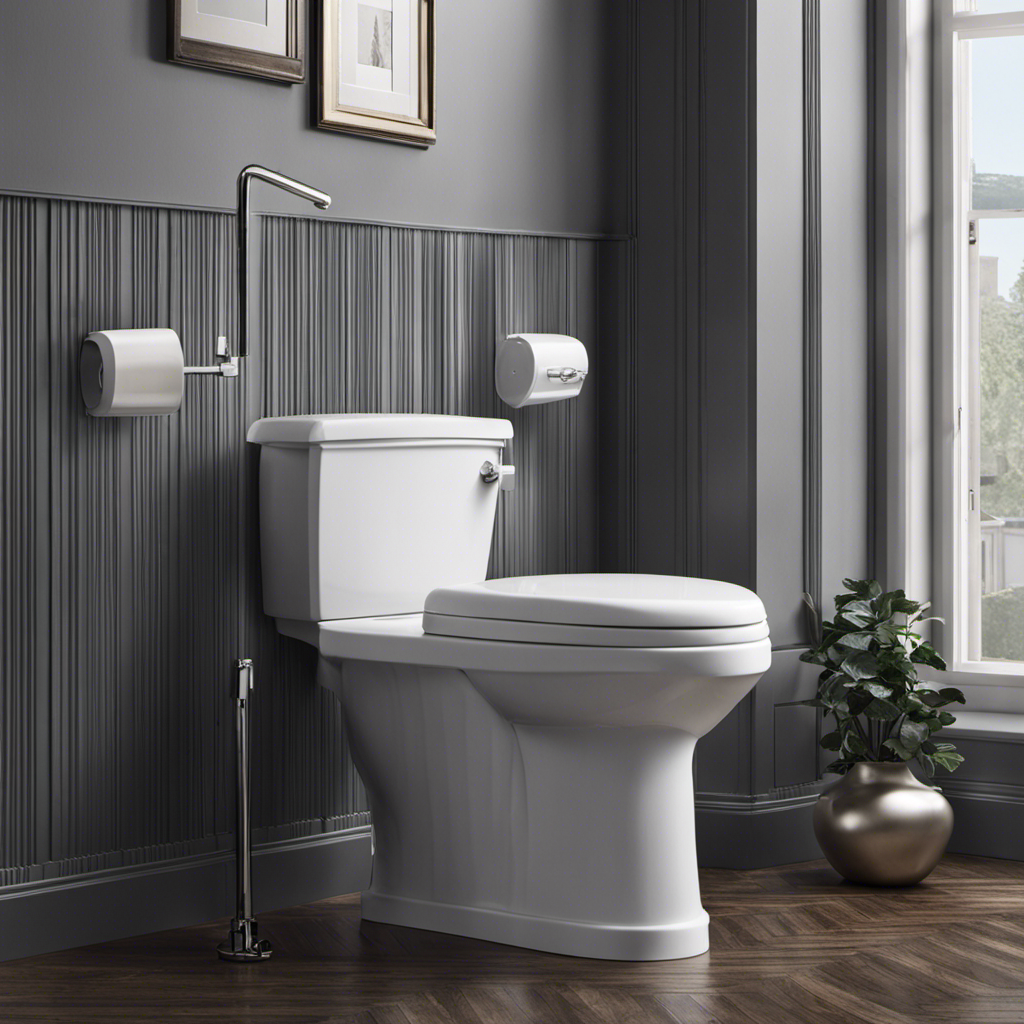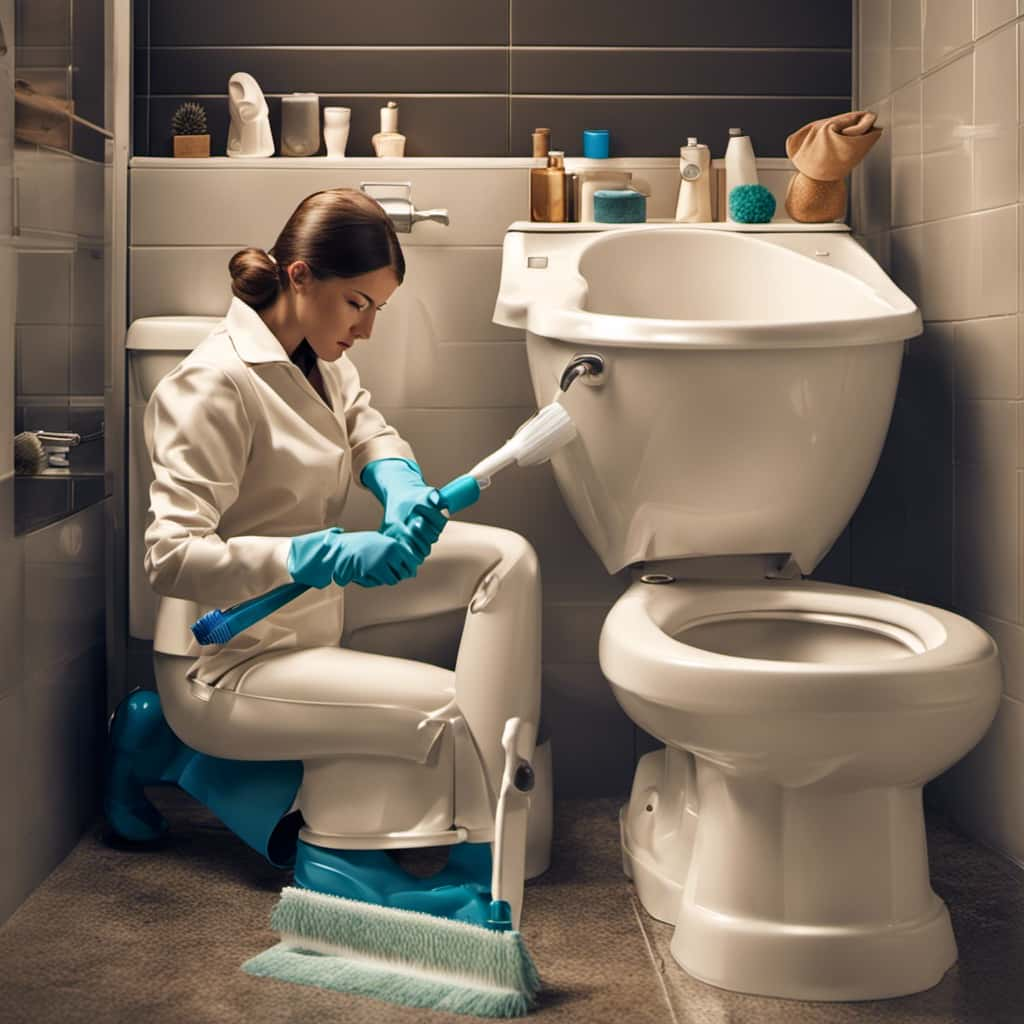I thought I knew everything there was to know about disposing of dog poop. Turns out, I was wrong. The Environmental Protection Agency (EPA) has some surprising guidelines on this very topic.
Did you know that flushing dog waste down the toilet is actually an acceptable method of disposal? It’s true! The EPA says that the water in the toilet goes to a sewage treatment plant that removes most pollutants, preventing contamination of our local streams and rivers.
But that’s not all. In this guide, we’ll explore alternative methods of disposal, address common questions, and learn why it’s so important to properly dispose of dog poop.
Let’s dive in and discover the safe ways to take care of our furry friends’ waste.
Key Takeaways
- Flushing dog poop in the toilet is a safe and acceptable method of disposal according to the EPA.
- Septic tanks are not suitable for digesting dog feces, so flushing should be avoided in these cases.
- Alternative methods for disposing of dog poop include using waste digesters, composting, and worm farms.
- Proper disposal of dog poop is important for both the environment and human health.
EPA Guidelines for Dog Poop Disposal
According to the EPA guidelines, it’s safe and acceptable to flush dog poop down the toilet. This method of disposal has several benefits, including reducing the environmental impact of dog poop.
When dog waste is flushed, it goes to a sewage treatment plant where most pollutants are removed. This ensures that the poop does not contaminate local streams and rivers.
Additionally, using flushable poop bags can be a convenient and eco-friendly option. These bags are designed to dissolve in water, making them suitable for flushing. By using flushable bags, you can further minimize the environmental impact of dog poop disposal.
It’s important to follow EPA guidelines and consider the best options for responsibly getting rid of dog waste.
Flushing Dog Poop in Septic Tanks
Flushing dog poop in a septic tank is not recommended as it can lead to tank filling quickly and toilet blockages. Here are some important points to consider regarding the disposal of dog poop in septic tanks:
-
Can septic tanks handle dog poop? No, septic tanks are not designed to digest the stronger pathogens present in dog feces. Flushing dog poop in a septic tank can disrupt the balance of good bacteria in the system, making it hazardous.
-
Is there a risk of septic tank blockages with dog poop? Yes, flushing dog poop in a septic tank can lead to the tank filling up quickly and causing toilet blockages. This can result in costly repairs and inconvenience.
To avoid these issues, households with septic systems should avoid flushing dog poop into the drain. Instead, consider alternative methods such as using flushable poop bags, waste digesters, composting, or connecting a separate toilet line for outdoor flushing.
Proper disposal of dog poop is crucial for protecting the environment and human health.
Hazards of Flushing Dog Poop in Septic Systems
I’ve learned that flushing dog poop in septic systems can lead to tank filling quickly and causing toilet blockages. Septic tanks have limitations when it comes to digesting the stronger pathogens present in dog feces. Dog poop resists the good bacteria in the septic system, making it hazardous.
Flushing dog poop in a septic tank can result in the tank filling up faster and potentially causing blockages in the toilet. It is important for households with septic systems to avoid flushing dog poop into the drain.
The septic tank dangers and septic system limitations make it necessary to find alternative methods for disposing of dog poop, such as waste digesters, composting, or using flushable poop bags.
Alternative Methods for Dog Poop Disposal
I prefer using waste digesters or composting as alternative methods for disposing of my dog’s poop. Here are the benefits of these methods:
-
Dog poop composting: Composting dog waste is an eco-friendly option that turns it into a nutrient-rich soil amendment. The composting process breaks down the waste, reducing its volume and eliminating pathogens. The resulting compost can be used to improve soil quality in gardens and landscapes.
-
Benefits of waste digesters: Waste digesters are devices specifically designed to break down dog waste. They use natural bacteria to digest the poop, converting it into a harmless liquid that can be safely disposed of. Waste digesters are convenient and odor-free, providing an efficient solution for managing dog waste.
Flushing Dog Poop Down the Toilet
Using the toilet to dispose of dog waste is a convenient and environmentally friendly option. Flushing dog poop down the toilet helps prevent the contamination of water sources and reduces the environmental impact of dog waste.
One way to make this method even more eco-friendly is by using biodegradable poop bags. These bags are made from materials that can break down naturally over time, reducing the amount of plastic waste that ends up in landfills. By choosing biodegradable bags, we can contribute to a cleaner environment.
It’s important to remember that dog waste can contain harmful bacteria and parasites that can contaminate water sources if not properly disposed of. Flushing dog poop down the toilet helps avoid this issue and ensures that our water sources remain safe and clean for everyone.
Using Flushable Poop Bags
Flushable poop bags offer a convenient and eco-friendly alternative for disposing of dog waste. Here are the benefits of using flushable poop bags and the environmental impact they have:
-
Convenience: Flushable poop bags are easy to use and eliminate the need for traditional plastic bags or scooping methods.
-
Biodegradable: These bags are made from materials that can break down in water, reducing their impact on the environment.
-
Reduced landfill waste: By flushing dog waste down the toilet using flushable bags, we prevent it from ending up in landfills where it can release harmful pollutants.
-
Water treatment: The water from flushed poop bags goes to sewage treatment plants that remove most pollutants, ensuring that dog waste does not contaminate local streams and rivers.
Using flushable poop bags is a responsible choice that offers convenience while minimizing the environmental impact of dog waste disposal.
Waste Digesters for Dog Poop Disposal
Dog waste digesters are an effective solution for disposing of pet feces without causing harm to the environment. These devices break down dog poop into a harmless, soil-like substance that can be safely absorbed into the ground.
One of the main benefits of waste digesters for dog poop disposal is that they eliminate the need for plastic bags, which take years to decompose. Additionally, waste digesters help prevent the spread of harmful bacteria and parasites that can contaminate soil and water sources.
To maintain a waste digester, it is important to regularly add the recommended amount of starter bacteria and enzymes, as well as keep the device clean and free of debris. It is also advisable to periodically check the digester’s level and empty it when necessary.
Composting Dog Poop
I find composting dog poop to be an eco-friendly and sustainable method of waste disposal. Here are the benefits of composting dog poop and the composting process:
-
Environmental Benefits: Composting dog poop helps reduce waste sent to landfills, minimizing methane emissions and groundwater contamination. It also prevents the need for plastic bags, which take years to decompose.
-
Nutrient-Rich Soil: The composting process turns dog poop into nutrient-rich soil called compost. This compost can be used to enrich garden soil, promote plant growth, and reduce the need for chemical fertilizers.
-
Composting Process: To compost dog poop, start by creating a designated composting area. Add a layer of carbon-rich materials like leaves or wood chips, followed by a layer of dog poop. Continue layering until the compost pile reaches a suitable size. Turn the pile regularly to aerate it and promote decomposition. After several months, the dog poop will break down into compost that can be used in your garden.
-
Safety Precautions: When composting dog poop, it’s important to handle it safely. Use designated compost bins or containers to prevent contamination. Avoid using the compost on edible crops to reduce the risk of pathogens.
Composting dog poop is an effective way to responsibly manage waste while benefiting the environment and promoting healthier soils.
Outdoor Flushing as an Option
Outdoor flushing allows for an easy and convenient method of waste disposal for dog owners. It provides several benefits, both for the dog owner and the environment.
One of the main advantages is the convenience it offers. With outdoor flushing, there is no need to handle or transport the dog’s waste to another location. Instead, it can be flushed down the toilet, just like human waste. This saves time and effort for the dog owner.
Additionally, outdoor flushing has a positive environmental impact. Flushing dog poop down the toilet ensures that it is properly treated at a sewage treatment plant. This prevents the contamination of local streams and rivers, which can happen if dog poop is left on the ground or placed in the trash.
Overall, outdoor flushing is a practical and eco-friendly solution for dog waste disposal.
Differences Between Human and Dog Poop
Flushing dog poop down the toilet is more hazardous than flushing human waste. Here are some key differences between human and dog poop:
-
Effect on water quality: Dog feces contain higher levels of harmful bacteria like fecal coliform, which can contaminate water sources when flushed down the toilet. This can lead to the deterioration of water quality and the spread of waterborne diseases.
-
Health risks associated with dog poop: Dog feces can pose various health risks to humans. The bacteria and parasites present in dog poop can cause illnesses such as kidney disorders, cramps, and diarrhea. These health risks are more severe compared to human waste.
-
Impact on the environment: When dog poop is flushed, it enters the sewage system and can end up in rivers, streams, or oceans. This can harm aquatic life and disrupt ecosystems, affecting the overall balance of the environment.
-
Proper disposal methods: Instead of flushing dog poop, it is better to use alternative methods such as using flushable poop bags, waste digesters, composting, or connecting a separate toilet line for outdoor flushing. These methods are more environmentally friendly and reduce the risks associated with dog poop.
Frequently Asked Questions
Can I Flush Dog Poop Down the Toilet if I Have a Septic Tank?
Yes, you can flush dog poop down the toilet if you have a septic tank. However, it is not recommended due to the risks it poses. There are alternative disposal methods available that are more environmentally friendly.
What Are the Potential Risks and Issues Associated With Flushing Dog Poop?
Flushing dog poop can pose risks and environmental concerns. It may contribute to water pollution and harm aquatic life. Additionally, certain pathogens in dog feces can contaminate water sources. It’s important to consider alternative methods for responsible disposal.
Are There Any Other Methods of Disposing of Dog Poop Besides Flushing and Putting It in the Trash?
Yes, besides flushing or putting it in the trash, alternative methods for disposing of dog poop include using biodegradable bags, waste digesters, composting, and connecting a separate toilet line to the sewer.
How Long Does It Take for Dog Poop to Decompose Compared to Human Poop?
Dog poop decomposes faster than human poop, taking about nine weeks. It’s important to properly dispose of dog poop to prevent health hazards and protect the environment.
What Are the Environmental Impacts of Flushing Dog Poop Down the Toilet?
Composting dog poop is a viable eco-friendly alternative to flushing. Exploring the use of biodegradable dog poop bags for environmentally conscious disposal is another option worth considering. It’s important to prioritize the environmental impact of dog poop disposal.
Conclusion
In conclusion, the EPA provides valuable guidelines for the safe disposal of dog poop to protect the environment and human health.
While flushing dog waste down the toilet is a recommended method, it is important to avoid flushing it in septic tanks due to the risk of blockages.
Alternative methods such as using flushable poop bags, waste digesters, composting, and outdoor flushing are also effective options.
Remember, dog feces can be more hazardous than human feces, so proper disposal is crucial.
Let’s do our part to keep our surroundings clean and safe for everyone.









